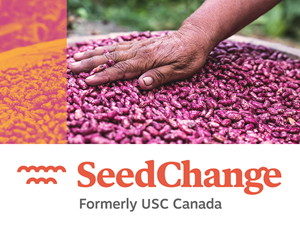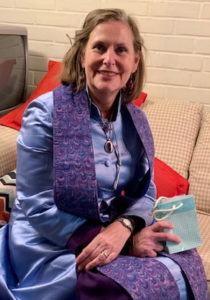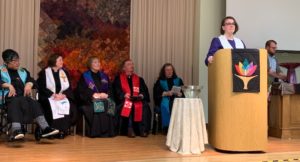CUC eNews: November 12, 2019 – Issue 102
In This Issue:
- Helping the CUC Help You: Request for Membership Information
- CUC Welcomes New Refugee Support Staff
- CanUUdle’s New Age Range is 14 – 19
- Protecting Your Email and Social Media Accounts
- CUC Aims to Offset Emissions from Board and Staff Flights
- SeedChange is USC Canada’s New Name
- Book Documents Unitarian Author’s Spiritual Journey
- Make a Difference by Serving: An Update from the CUC’s Nominating Committee
- Ordinations
- Upcoming Events
Helping the CUC Help You: Request for Membership Information
Last year, CUC staff asked your congregation for information on its staff and leadership. This was the first phase in updating the CUC’s membership database. When we stated the intention of also updating individual member information, concerns were expressed by some leaders about privacy and use of this information. So, we worked on providing thorough answers to the questions.
Why is the CUC requesting individual member information?
Every congregation that is a member of the CUC has a formal relationship with the CUC. CUC bylaw 2.4.4 states that “A member shall maintain its standing with the Council through furnishing the Council with reports and statistics as and when they may be reasonable required by the Council.”
Accordingly, when an individual agrees to join a CUC member congregation and share information with that congregation, implicit consent is given to share that information with the CUC.
As such, the CUC already has individual member information, from a previous database and from individuals who have had interaction with the CUC in one or more ways, typically as program/webinar participants or as individual donors. We would like to update all the information for more efficient communication, and which would enable the CUC to fulfill membership functions more efficiently.
CUC Privacy Statement
The CUC has developed a privacy statement with the help of former Board members Keith Wilkinson and Susan Ruttan. Please read it for answers to the following questions:
-
- Who does the CUC collect information about?
- What information is retained and not retained?
- Who has access?
- How is the information used?
- How is the information kept?
- What about privacy?
CUC staff will be in touch with your congregations’ leaders and administrators with more detail.
Read the CUC Privacy Statement
CUC Welcomes New Refugee Support Staff
The Canadian Unitarian Council is pleased to welcome Brigitte Khayat as refugee support staff. Brigitte replaces Samia Tecle, who accepted a full-time position with Immigration Refugees and Citizenship Canada (IRCC).
A Regulated Canadian Immigration Consultant, Brigitte has over 13 years of working experience with asylum seekers and refugees in both Egypt and Canada. She graduated with Honours from the Humber Business School Immigration Consultant Program, and is fluent in English, French, and Arabic.
Brigitte is already hard at work in her new position. She has been in communication with congregations with active sponsorships and applications, and was part of the Refugee Sponsors Support and Training event on October 26 at the Unitarian Congregation in Mississauga. She can be reached at brigitte@cuc.ca or refugee@cuc.ca.
Welcome Brigitte!
Learn How the CUC Supports Refugee Sponsorship
CanUUdle’s New Age Range is 14-19
 By Casey Stainsby, Youth and Young Adult Program and Events Coordinator
By Casey Stainsby, Youth and Young Adult Program and Events Coordinator
After much discussion and consultation, the Canadian Unitarian Council has decided to permanently change the age range for CanUUdle to 14-19 years old. CanUUdle is our annual, national youth conference that takes place every May long weekend. This event is a huge part of our youth programming, providing spiritual development and leadership opportunities for Unitarian youth and adults.
This decision comes after a year of reflection and consultation, and a trial of a 13-19 age range at CanUUdle XIX (May 17-20, 2019 in Calgary). Previously, CanUUdle and CUC youth events had used a 14-20 age range. Based on feedback from CanUUdle 2019 attendees (youth and advisors), and from parents, religious educators, youth advisors and ministers after the event, we have determined that imposing an age range of 14-19 will best serve the CanUUdle community and youth groups at this time.
Please note: Congregations are free to set their own age ranges for youth programs, events and congregationally-hosted cons, as those events are the responsibility of the congregations, and not the CUC. We do recommend having Youth Event Policies in place to help ensure that all youth events are safe and enjoyable.
CanUUdle and CUC youth ministry is geared to high-school aged youth. This age range will allow for more shared experience among participants and greater depth to programming. We encourage twelve and thirteen year olds to attend local and regional cons with their youth groups, which will help prepare them for the more intensive experience of CanUUdle. Junior youth will also continue to be invited to the Bridging Ceremony, and for games and dinner with younger CanUUdlers while the Bridgers spend time with the young adults.
Older youth who are not in high school or youth group can still attend CanUUdle up to their 20th birthday, but are encouraged to take on leadership/mentoring roles. They are also welcome to attend Chorus, the national young adult conference, which happens alongside CanUUdle each year. This change is possible in large part because of the existence of a thriving young adult community, ready to welcome in emerging adults as they transition out of youthood.
Parents and advisors inquiring about youth with birthdays close to CanUUdle (May or June 2020) should contact Casey Stainsby (casey@cuc.ca) ahead of time to discuss whether accommodations can be made. We welcome questions and comments about this change, and would like to thank everyone who has provided feedback and support for this process over the past year.
More information about CanUUdle XX (May 15-18, 2020) will be available in the new year on the CUC Events Calendar. We hope to see you in Halifax for a celebration of CanUUdle’s 20th anniversary!
Protecting Your Email and Social Media Accounts
Email scams and phishing are rampant. Many of us have had our emails or Facebook accounts hacked, know of someone who’s been lured by a scam, or have been a victim ourselves. We offer some tips to help keep you safer:
-
- All your devices should have virus protection (Malwarebytes is a good free one). If you suspect that you have already been hacked, clean your all devices first.
- Passwords should be complicated and hard to guess, so use a combination of upper and lower case, numbers, and symbols. Don’t use the same password for everything, or birth dates, favourite movies, names of pets – especially if you’ve shared these on social media. Google offers to save your passwords for you – it’s up to you if you decide to do this, but make sure you’ve protected your Google accounts if you do.
- Don’t share your passwords, or if you do, make sure it’s someone you trust.
- Use two-factor verification. Some sites offer this, where you sign in with your email, and an additional piece of information is requested. You can set this up for your Google accounts here..
- Set up recovery options – a phone number and a different email address (i.e. for your Google account, use another email like Yahoo or other provider) if you should happen to lose access to your accounts.
- Phishers will impersonate a trusted platform like banks, Canada Revenue Agency, Amazon, PayPal, and others. If you receive a suspicious email, always check directly with the source, rather than replying to that email. Phishing emails usually ask for something, whether it’s cash or purchasing gift cards, or to be in touch.
- CUC Board and staff will not send emails asking for money, except for fundraising emails which will always direct to the CUC website..
- Look at all originating emails carefully, e.g. ones that purport to come from someone you know asking for funds may show the correct name but use a fake address.
- If you use Facebook, set your security settings at the highest level:
-
-
- On your account in the top right corner, click on the little down arrow
- Click ‘Settings – Security and Log In’ to set your options there
- Click ‘Privacy Settings and Tools’ to configure your options. If you make it possible for everyone to find you, the chances are higher that your account can be hacked.
- Many organizations and businesses have their own email provider – the group’s information is only as secure as its weakest link. Make sure that everyone who uses the group email has followed steps to protect privacy and security.
-
Further questions? Email tech@cuc.ca
CUC Aims to Offset Emissions from Board and Staff Flights

Carbon atom
Aviation accounts for about two percent of global greenhouse gas emissions, a figure poised to grow in the coming years. This presents a challenge for staff and board members at the Canadian Unitarian Council, who live and serve congregations spread out across a vast country and often rely on air travel as the fastest means of transport.
Staff are responding to this challenge creatively — CUC Youth and Young Adult Ministry Program and Events Coordinator Casey Stainsby, for instance, took the train instead of flying to the young adults gathering at Unicamp in Ontario, and to the Western Region Gathering in Edmonton. But in situations where air travel is necessary, the CUC will be taking responsibility for its staff and board members’ flights by purchasing carbon offsets for travel in the future.
Carbon offsets are credits for greenhouse gas reductions achieved by one party that can be purchased and used to compensate (offset) the emissions of another party. Purchasing offsets, therefore, funds projects that will reduce the amount of carbon in the atmosphere by an amount equivalent to the carbon burned by your flight activity.
Carbon offsets are typically measured in tonnes of CO2-equivalents (or CO2e) and are bought and sold through a number of international brokers, online retailers, and trading platforms.
The CUC recognizes that carbon offsets shouldn’t be the first resort, and that shrinking one’s carbon footprint should always be the starting point. Purchasing carbon offsets, furthermore, is a complex process given that their sale operates in a largely unregulated marketplace. The CUC will take steps to ensure that the carbon offsets it purchases meet several criteria, among them:
-
- Ensuring that carbon offsets have been certified to meet a recognized standard, like those established by Gold Standard. Gold Standard was established in 2003 by the World Wildlife Fund and other international NGOs to ensure projects that reduced carbon emissions featured the highest levels of environmental integrity and also contributed to sustainable development. Some of their projects can be found here.
- That the offsets are real, verified, and enforceable.
- That the project would not have taken place had the offsets not been purchased.
The CUC encourages its members to consider purchasing their own offsets for emissions produced by air travel, adhering to the criteria listed above. To help with your research and decision-making, the CUC has pulled together some resources for you.
David Suzuki recommends:
-
- Using Gold Standard Certified Projects for carbon offsets
- Avoiding offset projects relating to tree-planting and destruction of halocarbon gases:
- offsets from tree-planting projects are problematic for a number of reasons, including their lack of permanence and the fact that these projects do not address our dependence on fossil fuels. Explore some examples of tree-planting projects.
- offset projects involving the destruction of halocarbon gases such as HFC-23 squeeze out more sustainable offset projects like solar and wind
- Asking questions like:
- Additionality: How do you know the utility would not have built the wind farm but for the money you gave them?
- Permanence: How do you know the timber company that planted those trees won’t just cut them down in a few years?
- Leakage: How do you know the landowner you just paid not to cut down an acre of rainforest won’t use the money to buy a different acre and clear that?
If deciding not to fund through Gold Standard Projects, here are some questions to ask the carbon offset vendor:
-
- What is/are the specific offset project type(s) (e.g., wind farm, methane capture, etc.) in your portfolio and where are the carbon offset projects located?
- Have your carbon offsets been certified to a recognized standard (Gold Standard, CDM, VCS, Climate Action Reserve, Green-e Climate Protocol for Renewable Energy, etc.) to ensure quality? If so, please list the standard(s).
- What steps have you taken to ensure that the carbon offsets you are selling are additional?
- How do you ensure that the greenhouse gas reductions that your carbon offsets represent are quantified accurately?
- Are 100 percent of your offsets validated and verified by accredited third parties?
- If you are selling offsets that will be created in the future (i.e., forward crediting), what mechanisms (insurance or otherwise) have you put in place to ensure those offsets will actually be delivered?
- What percentage of your portfolio (by tonnes of CO2e) is made up of offsets from tree-planting or agricultural soils projects? If it is a significant percentage (more than 20 percent of your portfolio), how do you address permanence risks?
- Do you use a publicly accessible registry to track your offsets? If yes, please list the website. If not, how do you ensure that your offsets are only sold to one buyer? And do you “retire” offsets that you sell?
- What is your company doing to educate consumers about climate change and the need for government policy to deal with it?
- Are you a member of the International Carbon Reduction and Offset Alliance (ICROA), which has a Code of Best Practice that members must adhere to?
More information on carbon offsets can be found via:
SeedChange is USC Canada’s New Name
 By Martin Settle and Jane Rabinowicz, Executive Directors, SeedChange
By Martin Settle and Jane Rabinowicz, Executive Directors, SeedChange
Next year, USC Canada will turn 75 years old. For the staff and Board of USC Canada, formerly known to many as the Unitarian Service Committee, seeing this milestone on the horizon has sparked much internal reflection. We are honoured to serve an organization with such a long and successful history.
Over the last few years, however, several events alerted us to a significant barrier. The majority of Canadians no longer recognize the name USC Canada. Younger Canadians never knew our founder, Dr. Lotta Hitschmanova.
Lotta’s intention when founding USC Canada was to seed positive change in the world. We’ve taken this quite literally in recent decades by shifting our focus to farming. The food movement is gathering steam, climate change is a growing focus, and ever more people feel compelled to do their part for global justice, health, and sustainability. We’re well-positioned to meet Canadians’ need for a way to take meaningful action.
Yet, when we reach out to new audiences to invite them to take part, we often fall flat. People always ask the same question — what does USC stand for? And because we are proud of our history, our association with Unitarians, and Lotta’s contributions, we happily tell them. But all too often, the message of what we do—supporting farmers in their fight for justice, health and sustainability— is overshadowed by our past. We confuse people.
We want to continue mobilizing Canadians to connect and contribute to our cause, just like Lotta did with so much passion in her time. We need to feel relevant to people today, and at the same time showcase the 75 year track record that helps build trust and confidence in our organization. So with much soul searching, and with the full participation of our staff, board, and longstanding supporters, we decided to change our name.
Unitarians have been our longest-standing supporters, and the early builders of our organization. We are happy to get the chance to share our new name with you. Our new name is SeedChange.
Getting used to a new name takes time, sometimes lots of time — we hope that you love it, and for those who don’t, we hope you’ll give it a chance to grow on you. We think this name does an excellent job of honouring our past while also serving the needs of our future. With a strong, recognizable and clear name, we can continue working with farmers to seed change and build a better world—make it a kinder, gentler place as our founder, Dr. Lotta Hitschmanova would have said—hopefully long into the future.
Thank you, and a warm welcome to SeedChange! Please reach out to us at any time, we would love to hear from you!
Jane Rabinowicz: jrabinowicz@weseedchange.org
Martin Settle: msettle@weseedchange.org
1-800-565-6872
Book Documents Unitarian Author’s Spiritual Journey
From trying magic mushrooms for the first time to dancing with witches, journalist Anne Bokma — a member of the First Unitarian Church of Hamilton — experimented with over 20 different spiritual practices that she shares in her new book My Year of Living Spiritually.
The book, now available for sale, also documents Bokma’s journey away from the strict fundamentalist religion of her youth towards the secular spirituality she found. In trying the various spiritual practices, Bokma found each of them changed her life for the better in some way and brought her meaning, community and a sense of peace.
Bokma believes the book will hold a special significance for others who consider themselves “spiritual but not religious,” a group whose membership comprises 80 million North Americans. She also believes it will resonate with other Unitarians, people who’ve found a spiritual home in that faith.
“I think this book appeals to people who realize we do have a spiritual dimension to our existence and it doesn’t have to happen in church,” she says. “Having said that, I have a chapter on community called ‘Finding Your Tribe’ and in that I talk about why I still do go to church and why the Unitarian Church is right for me and, I think, right for a lot of people who are spiritual but not religious.”
Watch the Book Trailer for My Year of Living Spiritually
Make a Difference by Serving: An Update from the CUC’s Nominating Committee 
You can make a significant contribution to the national UU community by serving on the CUC Board of Trustees (BOT) or the CUC Nominating Committee (NC). The Nominating Committee is inviting expressions of interest from or on behalf of individuals in congregations who are interested in serving on the CUC Board or Nominating Committee beginning in May 2020. Please contact any member of the NC to discuss the opportunities listed below.
The CUC’s Nominating Committee is responsible for identifying and nominating prospective members of the CUC Board. The NC meets monthly via web conference. NC members are elected at the Annual General Meeting in May for a three-year term.
NC open position:
– BC/Western Region (BC to Manitoba)
 The CUC Board of Trustees is responsible for governing the organization in the best interests of the ownership – the member congregations of the CUC. The Board, together with the Executive Director and Official Observers, meet face-to-face at the Annual General Meeting, and regularly by web conference. CUC Board Members are elected at the Annual General Meeting in May for a three-year term. More information on the Board is on the CUC website.
The CUC Board of Trustees is responsible for governing the organization in the best interests of the ownership – the member congregations of the CUC. The Board, together with the Executive Director and Official Observers, meet face-to-face at the Annual General Meeting, and regularly by web conference. CUC Board Members are elected at the Annual General Meeting in May for a three-year term. More information on the Board is on the CUC website.
BOT open positions:
– Central Region (Area between Kingston to Thunder Bay, Ontario)
– Youth Observer to the Board (YOB)
In 2019, the CUC Board of Trustees created a second Youth Observer to the Board (YOB) position. The Junior YOB will shadow and work with the Senior YOB, and in turn, become the Senior YOB the following year.
The primary purposes of the Youth Observer positions are:
– To bring youth perspectives and voices to the CUC Board
– To summarize youth issues for the Board
– To present Board positions back to Canadian UU youth
In 2020, a new junior YOB will be needed. For further information, check out the CUC website or contact the current YOB at yob@cuc.ca
Submit expressions of interest for the above positions to nominations@cuc.ca
Learn More About the Nominating Committee
Ordinations

Rev. Patricia Trudeau
Two ministers were ordained into Unitarian Universalist ministry in October. Rev. Danielle Webber was ordained by the Calgary Unitarians on October 20, and Rev. Patricia Trudeau was ordained by the Neighbourhood UU Congregation on October 27. Your national UU community congratulates and welcomes you both into ordained ministry!

Rev Danielle Webber
Visit & like the Canadian Unitarian Council on Facebook!
Upcoming Events 2019 – 2020
Share what’s going on in your congregation. Contact communications@cuc.ca
Youth and Young Adult
Online – Gathered Here: Young Adult Check-In, December 9, January 13, February 10, March 9, April 13, June 8, July 13, August 10 – 8 p.m. ET
Gathered Here is a monthly online check-in and gathering for Canadian Unitarian Universalist young adults.
Zoom (https://zoom.us/j/6792849010)
Online Events
Connect and Deepen – Virtual Gathering, Monthly – December 8, January 12, February 9, March 8 (2nd Sunday of the month), 4:00 – 5:30 p.m. ET
Join us for the opportunity to discuss matters of spiritual and theological significance in small groups and connect with people across the country.
Serving With Spirit: Stronger Together, Planning for Partnership, November 23, 9:30 a.m. – 2:30 p.m. MT
Explore our potential for meaningful, creative congregational networking and partnerships. Together, develop strategies to support and sustain the growing number of small congregations. Rev. Joan Becelaere is the presenter for this event. Registration deadline: November 12.
Rethinking UU Governance, Saturday, December 7, 2019, 12:30 – 2:00 p.m. ET
Many Canadian UU congregations struggle to find ways in which our very governance, style of organization, will reflect our values and resonate with the lives of those who engage within our communities. Join us for a conversation, beginning with two powerful stories and opening for all participants to share their ideas, experiments and questions. Our two presenters will be Mr. Sanford Osler, North Shore Unitarian Church and Rev. Jessica Rodela, Grand River Unitarian. Registration deadline: November 28.
National
2020 National Annual General Meeting and Conference, May 15 – 17, 2020, Halifax, Nova Scotia – Hosted by the Universalist Unitarian Church of Halifax
The theme for Conference 2020 is Making Waves! The call for streams and workshops has been issued. More information coming soon.
CanUUdle XX: Celebrate 20 years of CanUUdle!, May 15 – 18, 2020, Halifiax, Nova Scotia
Hosted by the Universalist Unitarian Church of Halifax
CanUUdle is the beloved annual youth conference where youth and adult allies from across Canada (and sometimes from the States!) gather to worship, build community, and grow in their Unitarian Universalist identities alongside the multigenerational National Conference. In 2020 CanUUdle will be celebrating its 20th anniversary. Registration will open in winter 2020. More information coming soon.
Chorus 2020: National Young Adult Conference, May 15 – 17, 2020, Halifax, NS
Join UUs from across Canada at the National Conference, where the theme for 2020 is Making Waves. There will be specific programming, worship, and socializing opportunities just for young adults within the multigenerational Conference, as well as the beloved Bridging Ceremony and dinner with the youth of CanUUdle. Registration will open in winter 2020. More information coming soon.
International
UU-UNO Intergenerational Spring Seminar On Climate Justice, April 15 – 18, 2020, New York, NY
Unitarian Universalist Association General Assembly, June 24 – 28, 2020, Providence, RI
International Council of Unitarians and Universalists (ICUU) Meeting & Conference, October 26 – November 1, 2020, Montreal, Canada
Supported by the CUC, this ICUU Conference is an excellent opportunity to meet and get to know UUs from all over the world. Donations from Canadians go to support leadership development for participants from emerging members groups.

